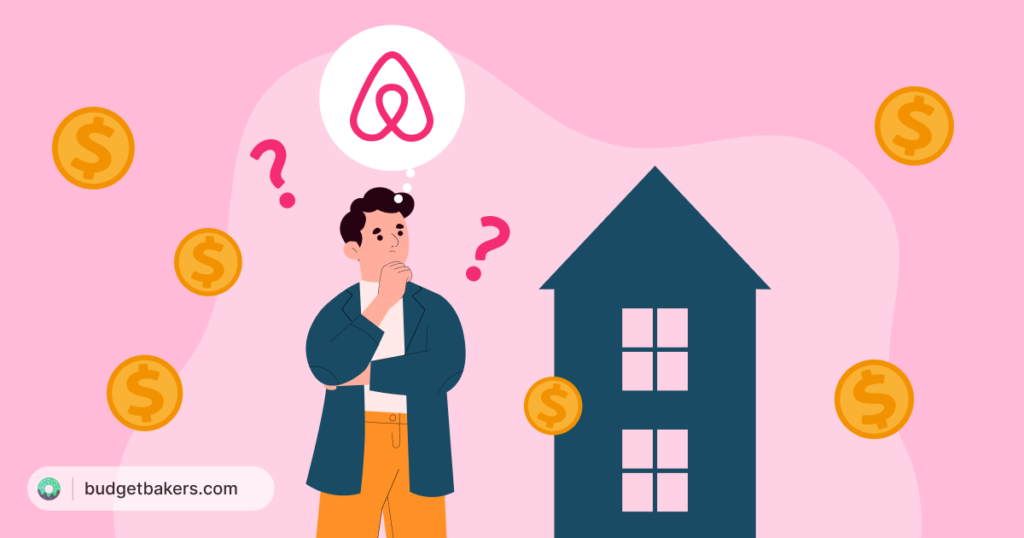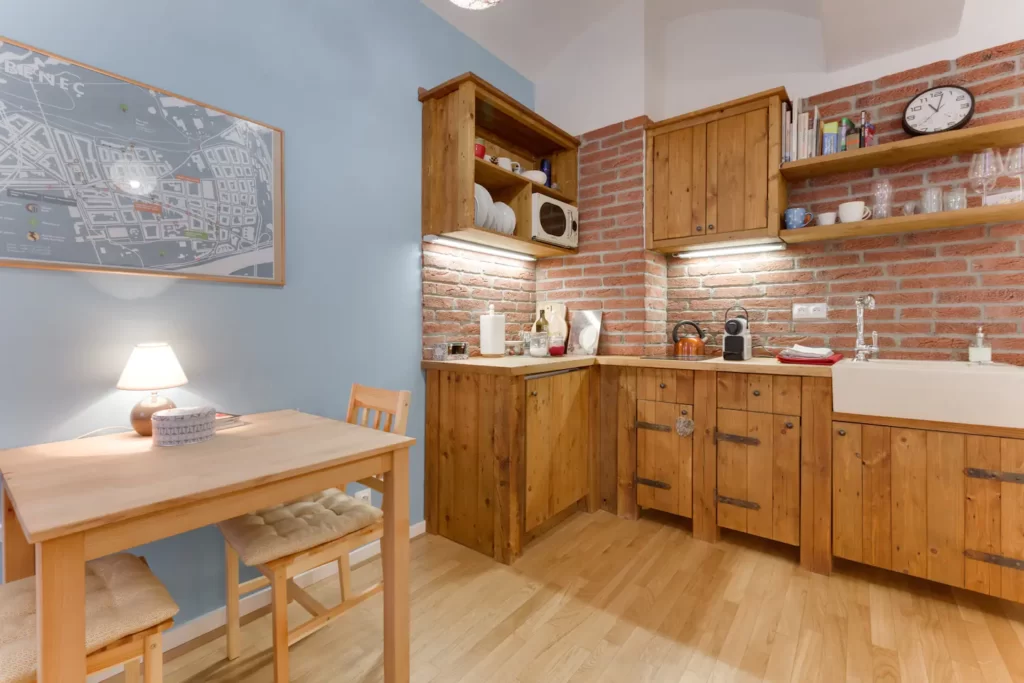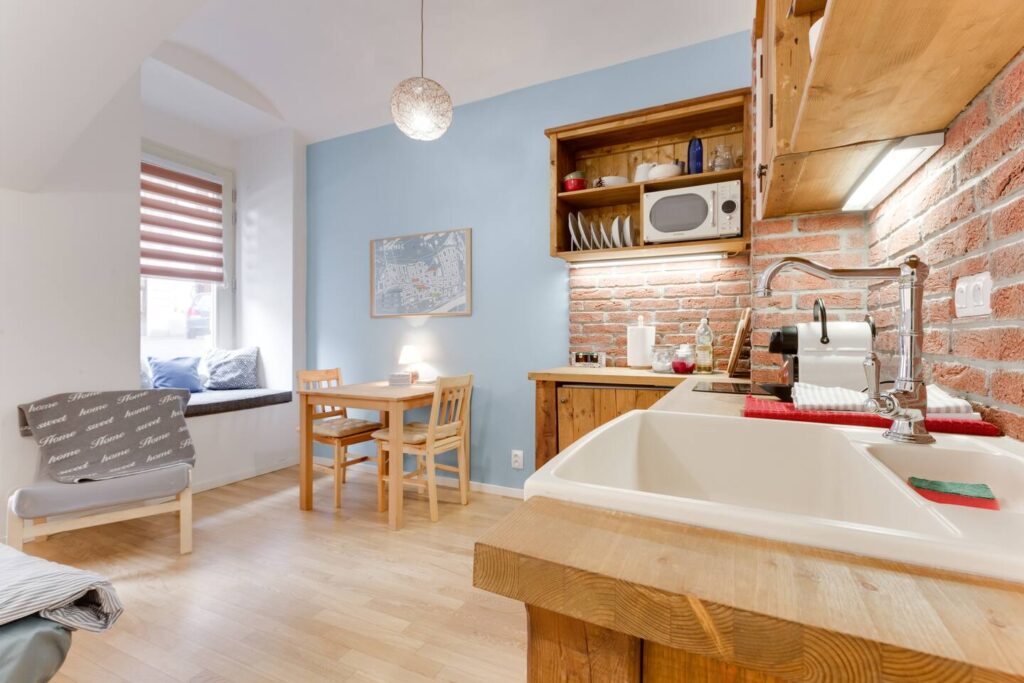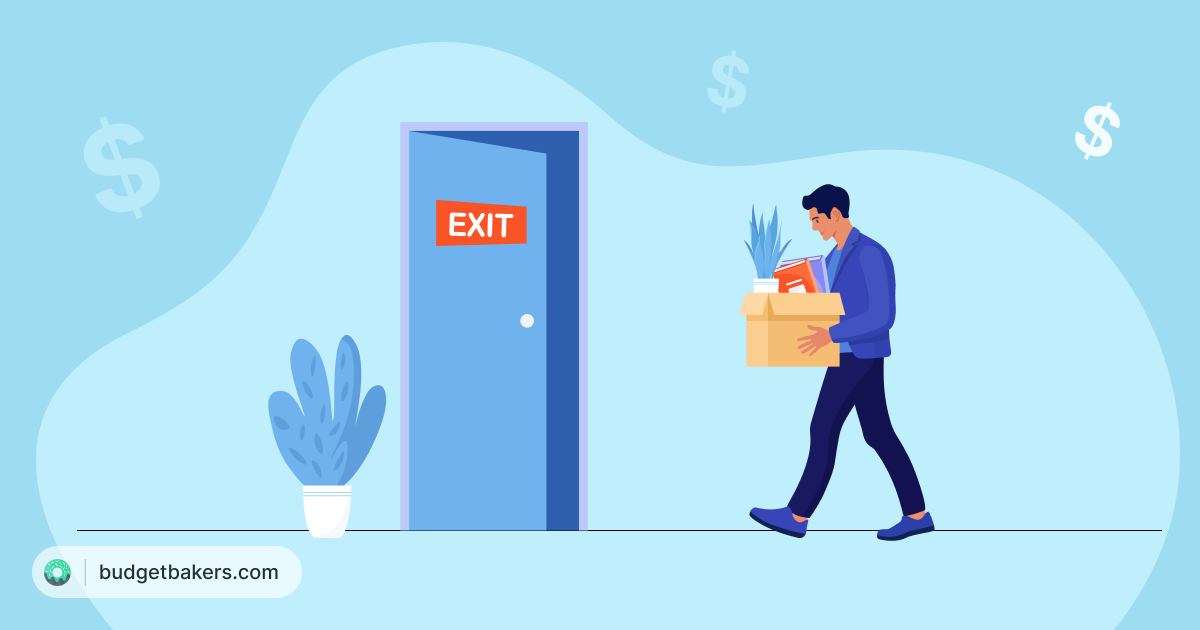For our second post detailing the financials of a real Airbnb, we turn to a real member of the BudgetBakers team who owns an Airbnb in Prague, our home city, and who helped us develop our Airbnb Revenue Calculator.
They have graciously shared their statistics to give us a sharper picture of what the economics of Airbnb look like. Here’s what they had to say:
Hi! I started my Airbnb listing about 7 years ago, when I got the opportunity to buy a studio flat in the same building where I was buying my first family home. Let’s go over some of my experiences, from the personal perspective to the financial.

Beginner’s Luck
The first ingredient to this story was luck: I found the perfect small property at an amazing price. I only paid the equivalent of about $50,000 for a studio flat of about 24m^2, and got an interest rate of only 2% fixed for 15 years. That was wildly lucky, and it only happened because the developer was going through financial difficulties and had to sell the property fast.
I never intended to buy this property, but I ended up in just the right place at the right time. I got it for a steal, and my journey began.



First off, I borrowed money to purchase the studio, and some extra to install a nice kitchen and other furniture. This all cost about $10,000 on top of the purchase price, and I was ready to go. I had done my basic research, and figured that my monthly mortgage payment, which was only about $250, plus the other fixed costs like electricity and water, would be about half of what I could expect to earn per month.
I have to say before we continue: this is not a typical story. Most people aren’t as lucky as I was, nor do most people have the access to financing that I did, especially these days. 7 years ago, Prague was a lot cheaper than it is today, and Airbnb was not as well known. Interest rates were also much lower.
I took a big risk, but I was also very lucky. If I had been more desperate, or if I had taken more time to think about what I was doing, I might have acted differently, and maybe I would have let the opportunity slip.
| Number of Rooms | Avg Base Rate | Occupancy Rate | Depreciation (per occupied night | Mortgage Rate | Airbnb Avg Fee | Inflation (CPI) | Property price | Net Adjusted Income (Year 1) |
| 1 | $75 | 90% | 0.01% | 2% | 3% | 8.10% | $60,000 | $23,967 |
As you can see from the financial picture: this listing has ended up being extremely profitable. So much so that the income from this one Airbnb now pays my whole family’s housing expenses, allowing us to save money and invest for our future.
But that would not have been possible if I had paid too much, or taken a loan on worse terms. Here’s what my financial picture would look like if I was trying to get that same property today, at today’s prices and interest rates:
| Number of Rooms | Avg Base Rate | Occupancy Rate | Depreciation (per occupied night | Mortgage Rate | Airbnb Avg Fee | Inflation (CPI) | Property price | Net Adjusted Income (Year 1) |
| 1 | $75 | 90% | 0.01% | 5% | 3% | 8.10% | $180,000 | $16,647 |
As you can see, a larger purchase price and higher interest would mean my profitability would drop by nearly 40%. That is a difference of only 7 years; while per-night prices have gone up a little bit, the mortgage rates and the property prices have both nearly tripled.
Beginner’s Mistakes
Of course, not everything ever goes according to the plan. My partner and I made a lot of mistakes, especially at the beginning. One of the mistakes we made was to pay too much attention to Airbnb’s “suggested pricing.” If you read the fine print, you’ll discover that these “suggested prices” have very little to do with what makes sense to charge for an Airbnb, and everything to do with Airbnb’s best interests (ie: to make your property cheaper).
AirBnb is interested in what makes them money, and they make money on guest fees no matter how much you charge per night. Don’t forget this. Airbnb originally suggested that we charge on $19 a night on average, and for some time we foolishly accepted this advice. Owing to that, we had to deal with a lot of other problems. Not only was the place not profitable, but a lower nightly price attracts a “certain kind” of guest.
We learned over the first year that below a certain price, people who booked our property were not as respectful or careful as those who had paid even slightly more. We found out that because they were seeking the cheapest possible deal, we often had students, low budget travelers, and others who either were difficult to deal with personally, or were constantly seeking further discounts and alterations to their reservations in an effort to save money.
Well, when you have too much business that doesn’t pay enough, you have to raise your prices. Once we had collected a number of positive reviews and had a good knowledge of what guests wanted, we began raising our prices, and earning a small profit.
One of the things we learned in this process was that it is better to have very positive reviews and a slightly high price, than it is to have mediocre reviews but a low price. So as we raised prices, we also began adding attractive amenities to the property to justify this higher price. We added gigabit fiber internet, a washer/dryer, a bigger hot water tank, a toaster oven, a coffee machine, and many other small details.
These investments paid off, and we were able to successfully raise our prices by about 50% over the first year, while maintaining a 5 star rating. Today our prices are about 100% higher than when we first got started, and our occupancy rate is near 100%.
Location and Cleanliness
In my view there are really two key factors that can make an Airbnb successful: cleanliness and location.
That’s really it. Over the course of nearly 7 years, consistently the things our guests comment on the most is that our flat is clean and in a good location. To maintain that image, we invest in deep cleaning every 6 months, and repainting every year or two at most.
There are many drawbacks to the property that would make you think it would not be highly rated, such as the fact that it’s on the ground floor, is only one room, and has no air conditioning. But consistently and for many years, the fact that it’s clean has earned us positive reviews.
Any location is potentially ok for an Airbnb, but having the perfect “location” is also about how you sell your listing. If the property is centrally located, say, next to a business center, then your listing should highlight that. If it’s in a party district, it should emphasize this. Our property is in a quiet artistic neighborhood, and we gave it a name that reflects this fact, along with the fact of it being “cozy” (small), and “modern” (which usually means it’s clean and functional).
The name has a lot to do with the success, but so does the upkeep. We made sure to find cleaners who were committed to making the flat look as good as in the listing photographs every time they clean. It’s not cheap, but it’s worth it. Since you can add cleaning fees to a booking on Airbnb, don’t be afraid to charge a little more and get a really good cleaning done. Your guests will really appreciate it.
Going with the Flow
There are times when Airbnb is problematic. For example, for half of 2020 and most of 2021, we suspended our listing and rented long term to a couple of students while the global pandemic raged on. We lost about $500 a month in unrealized gains we could have made on the property, but because we were in a good financial position, we never lost money. Once the pandemic subsided, we were in good shape to start doing Airbnb again.
It’s important to plan for both eventualities. You may find that hosting Airbnb isn’t for you, or that it’s too much work, or not profitable. If that’s the case, you need to be flexible and have a plan to rent out the property long term.
This is why I always strongly discourage anyone who asks me from leasing properties to rent-out on Airbnb. That is a huge risk, and I have seen it go wrong for people, particularly during the pandemic. In my view, if you’re paying anyone’s mortgage, it should be yours. That way even if you don’t make a profit, you still build equity in your property.
Under-Promise, Over-Deliver
Finally, an important aspect of running a successful Airbnb is to delight and surprise your customers.
How do you do this? It’s not hard! All you have to do is give your guests things they don’t expect. That’s why for every single guest, I will set aside 5-10% of the income from that guest to prepare them a special care package. The longer they stay (meaning the more they pay) the lower the percentage.
So, for example, if a guest is going to be staying with us for one month, and paying about $1200, I will set aside around $50 to $60 to prepare something extra special for them. It could be a bottle of wine, a selection of local sausages and cheeses, or a gift certificate to a local cafe or book store. Anything I think that guest will appreciate. This not only rewards loyalty and encourages repeat visits, but it also vastly improves your chances of a highly positive review.
And remember: the better your reviews, the more you can charge. So don’t be greedy! Invest in surprising your guests as much as possible. Don’t be afraid to be creative. Here are a few of the ideas I’ve used over the years:
- A plate of cheeses, sausages and wine
- A gift certificate for dinner for two at a local restaurant
- A gift certificate to a local bookstore
- A bouquet of fresh flowers
- A local transit pass for the length of the guest’s stay
- A certificate for a professional couple’s photograph at a local photography studio
- Tickets to the local cinema or theater
- Concert tickets (exchangeable)
The limits are your imagination. What do your guests not expect?
Want to Share Your Story?
If you’re interested in sharing your experiences of working in the sharing economy, we would love to share your story! Email our personal finance writer Leonie Bauer at leonie.bauer@budgetbakers.com and tell us your story.


